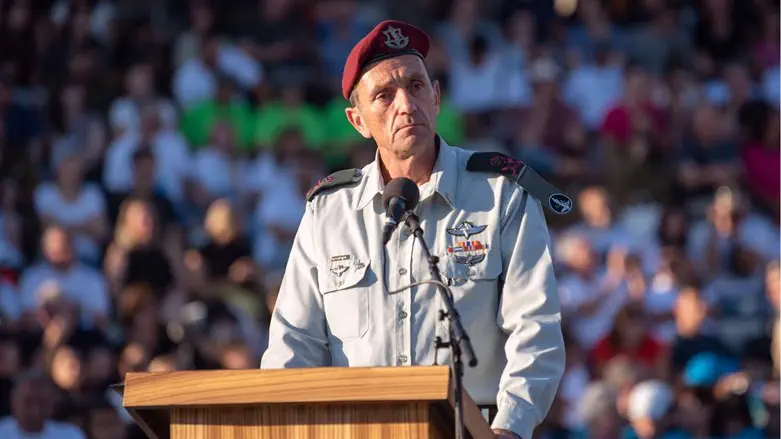
Incoming IDF Chief of Staff Herzi Halevi believes that the Hesder program, which combines Torah study with a shortened military service, is an "outstanding program", but suggests extending it. He also doesn't see an issue with holding Torah classes "for anyone who is a soldier in the Jewish army in Israel."
Befitting for a senior IDF officer, Halevi rarely expresses himself in the media or on non-defense-related matters, but 10 years ago he made an exception when he gave a lecture at the Orot Shaul Yeshiva.
At the start of his lecture, the senior officer mentioned that he studied at the Himelfarb religious high school in Jerusalem, and noted that he remembers his time there fondly.
Although he doesn't wear a Kipa on a daily basis, he leads a religious lifestyle. "I don't always wear a Kipa on my head," he said. "I try to stay away from being classified, I don't like all of the classifications. I lead a religious lifestyle in my own way."
One of the moments that Halevi remembers from his time as the Paratroop Brigade commander is the time that he found out that the religious soldiers won't participate in a regimental retreat due to possible modesty issues that were to arise. "We just began an exercise in the Golan Heights. In my second week on the job, I approve a retreat week for one of the battalions. The commander shows me the plans and tells me that the religious soldiers won't be with them, they'll be somewhere else where they'll have Torah classes."
Halevi described his feelings at the moment. "My skin felt like needles, it made me uncomfortable." Because they were short on time he approved the plan, but he made a note to make sure that religious soldiers would be able to participate in future retreats.
"A year later there was another retreat," he says. "We planned in advance. We changed it from a retreat to an educational week. I told my men 'listen, we a supposed to fight together, there's no way that in the state of Israel, religious and secular youth can't have a cultural event together without offending each other'. If there's a swimming pool and there's a problem there, no problem will have separate hours for men and women. And if they want classes there are enough classrooms, we can have them for everyone, Judaism should be equal for every soldier in the Jewish army in Israel. It was successful."
The future chief of staff praises the Hesder program, but as mentioned above, he believes that the active military duty period of those in the program (which is currently a year and five months) should be extended to two years. "It's important that I mention how much I appreciate the program, I think it's an outstanding program."
According to him "If we were to extend the service period to 26 months, which is still shorter than the full mandatory service, the IDF can add another infantry brigade. We are short on combat soldiers. If more youth were to draft we can create another brigade because the next war won't be only in Gaza or only in Lebanon.
I think we need to make a drastic change, I don't think we need to close the program," he added.
As previously reported, Halevi lives in Kfar Ha'oranim, a secular town in Samaria. He was born in Jerusalem. His father is the son of Haim Shalom Halevi (Gordin), who fought for the Irgun underground before the founding of the state of Israel, and Tzila, the daughter of Dov Ber Kook, and niece of Rabbi Avraham Yitzhak Hakohen Kook. Herzi was named after his uncle, Herzel, who was killed during the Six Day War during the battle for Jerusalem.
Dvir Amar reported that Halevi would regularly study with Rabbi Ohad Tirosh, the head of the Bnei David post-army yeshiva. The two served together in the IDF and have stayed friends ever since.
